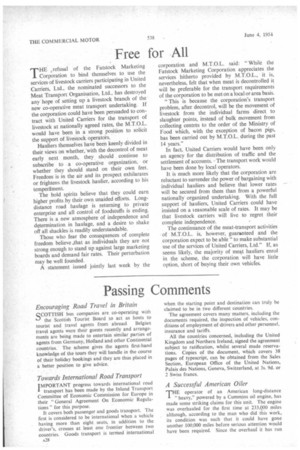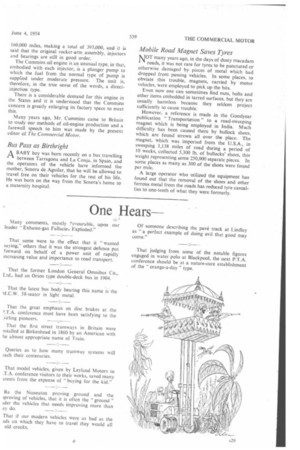Passing Comments
Page 30

Page 31

If you've noticed an error in this article please click here to report it so we can fix it.
Encouraging Road Travel in Britain
qcornsH bus companies are co-operating with '—' the Scottish Tourist Board to act as hosts to tourist and travel agents from abroad. Belgian travel agents were their guests recently and arrangements are being made to entertain similar parties of agents from Germany, Holland and other Continental countries. The scheme gives the agents first-hand knowledge of the tours they will handle in the course of their holiday bookings and they are thus placed in a better position to give advice.
Towards International Road Transport
IMPORTANT progress towards international road I transport has been made by the Inland Transport Committee of Economic Commission for Europe in their "General Agreement On Economic Regulations" for this purpose.
It covers both passenger and goods transport. The first is considered to be international when a vehicle having more than eight seats, in addition to the driver's, crosses at least one frontier between two countries. Goods transport is termed international when the starting point and destination can truly be claimed to be in two different countries.
The agreement covers many matters, including the documents required, the inspection of vehicles, conditions of employment of drivers and other personnel, insurance and tariffs.
All the countries concerned, including the United Kingdom and Northern Ireland, signed the agreement subject to ratification, whilst several made reservations. Copies of the document, which covers 38 pages of typescript, can be obtained from the Sales Section, European Office of the United Nations, Palais des Nations, Geneva, Switzerland, at 3s. 9d. or 2 Swiss francs.
A Successful American Oiler
THE operator of an American long-distance
"heavy," powered by a Cummins oil engine, has made some striking claims for this unit. The engine was overhauled for the first time at 233,1200 miles although, according to the man who did this work, its condition was such that it could have gone another loopoo miles before serious attention would have been required. Since the overhaul it has run 160,000 miles, making a total of 393,000, and it is said that the original rocker-arm assembly, injectors and bearings are still in good order.
The Cummins oil engine is an unusual type, in that, embodied with each injector, is a plunger pump to which the fuel from the normal type of pump is supplied under moderate pressure. The unit is, therefore, in the true sense of the words, a directinjection type.
There is a considerable demand for this engine in the States and it is understood that the Cummins concern is greatly enlarging its factory space to meet this.
Many years ago, Mr. Cummins came to Britain to study our methods of oil-engine production and a farewell speech to him was made by the present editor of The Commercial Motor.
Bus Pass as Birthright
ABABY boy was born recently on a bus travelling between Tarragona and La Conja, in Spain, and the operators of the vehicle have informed the mother, Senora de Aguilar, that he will be allowed to travel free on their vehicles for the rest of his life. He was born on the way from the Senora's home to a maternity hospital.
Mobile Road Magnet Saves Tyres
NOT many years ago, in the days of dusty macadam
roads, it was not rare for tyres to be punctured or otherwise damaged by pieces of metal which had dropped from passing vehicles. In some places, to obviate this trouble, magnets, carried by motor vehicles, were employed to pick up the bits.
Even now one can sometimes find nuts, bolts and other items embedded in tarred surfaces, but they are usually harmless because they seldom project sufficiently to cause trouble.
However, a reference is made in the Goodyear publication " Transportation " to a road-sweeping magnet which is being employed in India. Much difficulty has been caused there by bullock shoes, which are found strewn all over the place. The magnet, which was imported from the U.S.A., in sweeping 1,138 miles of road during a period of 10 weeks, collected 5,300 lb. of bullocks' shoes, this weight representing some 250,000 separate pieces. In some places as many as 300 of the shoes were found per mile.
A large operator who utilized the equipment has found out that the removal of the shoes and other ferrous metal from the roads has reduced tyre casualties to one-tenth of what they were formerly.












































































































